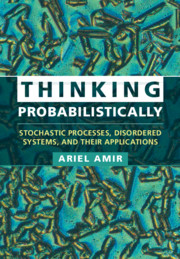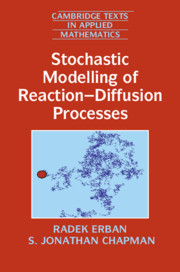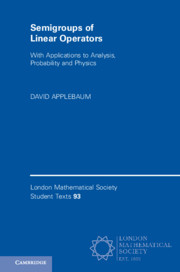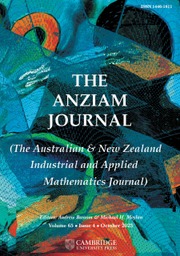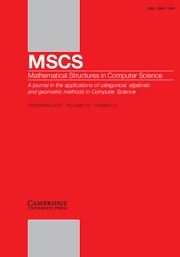Thinking Probabilistically
Stochastic Processes, Disordered Systems, and Their Applications
$52.99 (P)
- Author: Ariel Amir, Harvard University, Massachusetts
- Date Published: February 2021
- availability: In stock
- format: Paperback
- isbn: 9781108789981
$
52.99
(P)
Paperback
Other available formats:
Hardback, eBook
Looking for an examination copy?
If you are interested in the title for your course we can consider offering an examination copy. To register your interest please contact [email protected] providing details of the course you are teaching.
-
Probability theory has diverse applications in a plethora of fields, including physics, engineering, computer science, chemistry, biology and economics. This book will familiarize students with various applications of probability theory, stochastic modeling and random processes, using examples from all these disciplines and more. The reader learns via case studies and begins to recognize the sort of problems that are best tackled probabilistically. The emphasis is on conceptual understanding, the development of intuition and gaining insight, keeping technicalities to a minimum. Nevertheless, a glimpse into the depth of the topics is provided, preparing students for more specialized texts while assuming only an undergraduate-level background in mathematics. The wide range of areas covered - never before discussed together in a unified fashion – includes Markov processes and random walks, Langevin and Fokker–Planck equations, noise, generalized central limit theorem and extreme values statistics, random matrix theory and percolation theory.
Read more- Explains the power of probability theory both as a conceptual framework and as a tool across mathematics and physics
- Avoids using unnecessary technicalities, keeping the mathematical prerequisites to a minimum
- Contains numerous and diverse examples of interdisciplinary applications of probability theory
Reviews & endorsements
‘A remarkable demonstration that advanced topics need not be esoteric. Amir takes us through random walks on networks, extreme value statistics, Kramers theory, anomalous diffusion and other topics generally omitted from introductory texts, always rooting every discussion in applications of terrific current interest. I found the discussion of Lévy-stable distributions especially insightful as a principled approach to the nonstandard walks that abound in contexts from biophysics to finance.' Philip C. Nelson, University of Pennsylvania
See more reviews‘The book is a suitable springboard for self-study because it introduces a wide variety of topics and contains many references to current work. In the classroom, the book can function either as the basis for a course in special topics or as a source of material to spice up more traditional statistical-mechanics courses … the methods for studying random phenomena introduced in Thinking Probabilistically will help readers understand reasoning techniques that may not be terribly familiar to physicists. Moreover, following the author’s arguments is a rewarding intellectual exercise in its own right.’ Rob de Ruyter, Physics Today
Customer reviews
Not yet reviewed
Be the first to review
Review was not posted due to profanity
×Product details
- Date Published: February 2021
- format: Paperback
- isbn: 9781108789981
- length: 242 pages
- dimensions: 243 x 170 x 15 mm
- weight: 0.44kg
- availability: In stock
Table of Contents
1. Introduction
2. Random walks
3. Langevin and Focker–Planck� equations and their applications
4. Escape over a barrier
5. Noise
6. Generalized central limit theorem and extreme value statistics
7. Anomalous diff usion
8. Random matrix theory
9. Percolation theory
Appendix A. Review of basic probability concepts and common distributions
Appendix B. A brief linear algebra reminder, and some Gaussian integrals
Appendix C. Contour integration and Fourier transform refresher
Appendix D. Review of Newtonian mechanics, basic statistical mechanics and Hessians
Appendix E. Minimizing functionals, the divergence theorem and saddle point approximations
Appendix F. Notation, notation...
References
Index.-
General Resources
Find resources associated with this title
Type Name Unlocked * Format Size Showing of
This title is supported by one or more locked resources. Access to locked resources is granted exclusively by Cambridge University Press to instructors whose faculty status has been verified. To gain access to locked resources, instructors should sign in to or register for a Cambridge user account.
Please use locked resources responsibly and exercise your professional discretion when choosing how you share these materials with your students. Other instructors may wish to use locked resources for assessment purposes and their usefulness is undermined when the source files (for example, solution manuals or test banks) are shared online or via social networks.
Supplementary resources are subject to copyright. Instructors are permitted to view, print or download these resources for use in their teaching, but may not change them or use them for commercial gain.
If you are having problems accessing these resources please contact [email protected].
Sorry, this resource is locked
Please register or sign in to request access. If you are having problems accessing these resources please email [email protected]
Register Sign in» Proceed
You are now leaving the Cambridge University Press website. Your eBook purchase and download will be completed by our partner www.ebooks.com. Please see the permission section of the www.ebooks.com catalogue page for details of the print & copy limits on our eBooks.
Continue ×Are you sure you want to delete your account?
This cannot be undone.
Thank you for your feedback which will help us improve our service.
If you requested a response, we will make sure to get back to you shortly.
×
